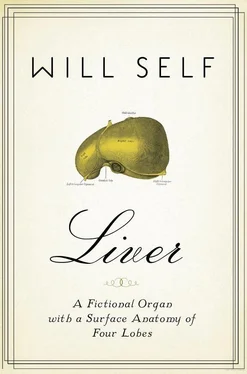Isobel turned to him. ‘She’s asleep,’ she said, and, taking the handset from the pillow, replaced it on the cradle. ‘But I’ll sit with her for a while.’
He left, and that’s what she did. She sat, and, as the footfalls outside grew more and more scattered, she wept. The fog oozed up from the surface of the lake, infiltrating the narrow winds of the old town, pressing against the plate-glass windows of the underwear boutiques along the Rennweg, imposing its grey shroud of modesty on the brazen plastic models.
In the morning the fog was still there; daylight struggled to illumine the stony fa  ades and blank windows. As she woke, Joyce recalled what the minicab driver who’d driven them to the airport had said.
ades and blank windows. As she woke, Joyce recalled what the minicab driver who’d driven them to the airport had said.
The A45 was its usual coagulation, and he kept switching lanes, speeding up, then braking so hard that Joyce’s bloated middle pressed uncomfortably against the door handle. ‘Please,’ she gasped. ‘Please, really, there’s no hurry — we’re in plenty of time.’
‘It’s true,’ he replied; the fight went out of him and he slumped over the steering wheel. ‘You’re a long time dead.’
Isobel winced, while Joyce thought: why is it that even those closest to me regard my dying as socially awkward?
Rising in slow stages, Joyce ran through the checklist that confirmed she was unfit for duty: the banging headache and the wire in her urethra, the painful numbness of fingers and toes, the cruel blockage in her oesophagus and the malevolent gravity of her internal organs.
She limped to the bathroom and pulled the cord. The woman in the mirror, with her sparse skullcap of grey-white hair, looked like Death’s mother.
Not long after she had been diagnosed, while she was undergoing the useless chemo and radio, Joyce had begun marvelling at this aspect of her illness. All her life she had been engaged in a secret conversation with her body; whispered talk concerning the removal of her mucus, the blotting of her blood, and the evacuation of her bowels; consultations regarding the squeezing of her blackheads and the plucking of her hairs. In this, Joyce supposed, she was no different to anyone else. But now this chit-chat had been shouted down. Joyce’s body had revolted. The respectable working-class liver cells had gone berserk, smashing the chemical refinery they laboured in, then charging down the bloody boulevards to carry their fervour to gall bladder, bowel and lungs. They would not stop until they had toppled the sovereignty of consciousness itself, and replaced it with their own screaming masses of cancerous tissue.
Peeing, then wiping herself, then fighting to brush her teeth, Joyce reeled once more under the revolutionary terror, and so remembered what day this was, and why she was in her familiar purple nightie, shaking in this strange yellow bathroom.
The imminence of her death — and the fact that she, herself, had booked the abattoir — pole-axed the poor cow . So she sat, stupidly sullen, while her milkmaid daughter helped dress her for the slaughter.
Isobel, who had barely slept, despite four massively overpriced gin and tonics in the hotel bar, was equally stunned. Ridiculously, they were late, and the continental breakfasts she had ordered for them lay untouched on white linen covered trays.
‘Mum, I’ve asked them to get us a cab,’ she said. ‘It should be here in a few minutes. I’m sorry there’s no time. ’ She gestured helplessly at the croissants, the furled Emmental and smoked ham, the freshly squeezed orange juice. Joyce ignored the breakfast gaffe ( Still, how many times have I told her that I mustn’t eat before. ), ‘Well, dear, you’ll need to make up some time later if you want to pack and check out in time to avoid paying a supplement.’
Her parsimony, Joyce knew, was inhuman — and yet all too human.
Isobel had begun to sob uncontrollably. But we have been over all this time and again! Just as Joyce had forced her daughter through several tutorials in the study, so that she would be able to find all the papers required for probate, so Joyce had also rehearsed these last few hours and minutes, blocking out every move with precision and care, all but scripting lines for both of them.
Joyce understood intuitively what every executioner soon discovered: perfect choreography is essential if messiness and hysteria are to be avoided. So, although hustled towards extinction by her daughter’s poor time-keeping, Joyce was determined to keep her cool.
For the facts were these: apart from Isobel’s preschool years — the early 1970s, a good time to take a rest on the career ladder — Joyce had spent her entire working life as a hospital administrator; she had ended up running a large trust, responsible for many staff and patients. She had, she hoped, brought all this professionalism to bear on her own death.
Joyce struggled upright. She was wearing her comfortably lined ankle boots, a smart tweed suit, dark tights and a cream silk blouse. The emerald brooch Derry had given her on their twentieth wedding anniversary was pinned to her lapel. She hadn’t troubled with an incontinence pad; there’s nothing left now . Her mouth was fearfully dry; they had said no liquids or solids before arriving at 84 Gertrudstrasse, but that can’t possibly include Polos, can it? Joyce fingered out one of the small white rings and slid it between her chapped lips; then, as they moved to the lift, she worked it with her tongue, savouring the dissolution of its minty wash.
Around her was the lift clunk and then the lobby chill. The Widder staff who opened the doors knew. They know . At each encounter there was a familiar Gr ü ezi or a haughty Guten Tag . Then Isobel and the doorman were in hushed consultation regarding their destination.
‘To live with dignity, to die with dignity.’ That was their motto. What Joyce had appreciated most during her dealings with the executioners she had appointed was their commitment to best practice. All communications had been brief and to the point. She had made the 3,500 Euro deposit weeks before. The doctor’s prescription for 25 grammes of natrium phenobarbital, together with his attendance and that of the suicide assistant, had been brusquely and competently organized.
Joyce chided herself, for had she not loved and been loved? Had she not run, swum and smelt? She might not have had all that she’d wanted — but there had been all that she’d needed. But then there was Isobel, unmade-up, her handbag a gaping straw basket in which the disorder of her life — multiple packets of chewing gum, cigarettes and nicotine lozenges, loose change, dumb trinkets — was on view for all to see.
As the Mercedes tumbril rolled over the cobbles of the Rennweg, then jolted into Sihlstrasse, Joyce marvelled at her own cold detachment: Isobel and all her disordered passions — her drinking and, no doubt, her drug-taking, her queer boyfriends and unpaid debts — was an administrative problem that Joyce had been unable to shift to her out tray before she died. Isobel, who was crying again — although her mother, meanly, felt certain it was self-pity alone — remained pending. Joyce had so little faith in her that she had decided to do without a funeral: no matter how careful her instructions, Isobel would be bound to muck it up .
The fog lay low over the city, so that the tram cables underscored its obscure notation.
Joyce had read in the tourist guide that the Zü richers enjoyed the best quality of life in the world. They didn’t look as if they were enjoying it much this morning, these black-clad revenants hurrying through the grey. Nevertheless, the cleanliness of the streets, the orderliness of the populace, the efficiency of the infrastructure — you are never more than a hundred metres from the nearest bus, tram or train stop — were there for all to see. It was utterly unlike the splurge of Birmingham, a city, Joyce thought, that no matter how much it primped itself up , always looked like it had got out of civilization’s bed on the wrong side and was shambling across Middle England kicking housing estates and retail parks out of its roadway.
Читать дальше

 ades and blank windows. As she woke, Joyce recalled what the minicab driver who’d driven them to the airport had said.
ades and blank windows. As she woke, Joyce recalled what the minicab driver who’d driven them to the airport had said.










